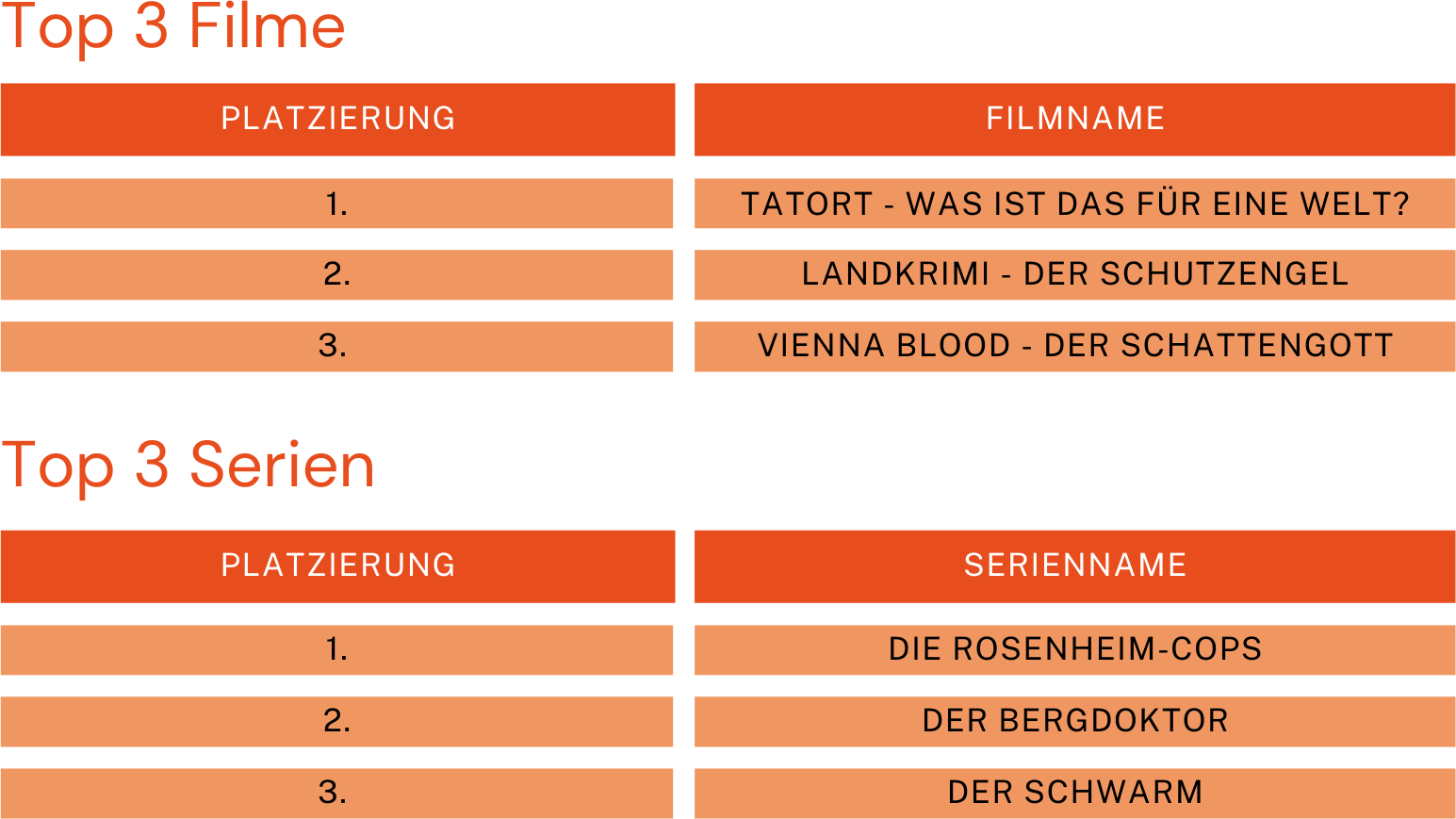The question of whether there are too many crime dramas on ORF seems justified when you look at the large number of crime dramas broadcast in 2023. From the regional crime dramas, which are always set in a different Austrian province and exude local color, to the fixed Friday crime dramas in the form of "Der Staatsanwalt", "Die Chefin" and "Der Alte", the evergreens "Donna Leon", "Der Bulle von Tölz" and "Columbo", which are usually broadcast on Saturdays, the "Rosenheim Cops" on Thursdays, through to crime thrillers depicting European cities and countries such as "Der Barcelona-Krimi", "Der Zürich-Krimi" or "Der Irland-Krimi". And, of course, not forgetting the Sunday fixture for many decades: "Tatort". All these crime dramas have one thing in common: very good ratings. This prompts public television broadcasters in particular, such as ORF, but also ZDF and ARD in Germany, with whom ORF often co-produces, to focus on the successful "crime thriller" genre. The high budget spent on in-house and co-productions must be justified and reach as wide an audience as possible. But why is it crime dramas in particular that repeatedly attract so many viewers to the screens? One reason is the structure of this genre: there is "a problem" - i.e. a crime - and a familiar figure in the form of a detective or commissioner appears, takes on the case and ensures "law and order" in the end. Viewers can indulge in a thrill that they are not exposed to in real life. Endorphins are released, which make them feel good. Relaxation follows at the end, when everything is resolved and ends well. A stark contrast to the omnipresent, often seemingly unsolvable problems and trouble spots in the world. This escapism into manageable and easily categorizable fictional worlds is one of the impulses for crime thrillers in the midst of an ever-increasing flood of different program content. A particularly good example of this is "Die Rosenheim-Cops", which uses stereotypical characters and storylines to create a sense of security and familiarity and a comedic tone to make viewers smile.
On the other hand, crime thrillers unite a wide range of age groups and are popular with both men and women. Fixed points such as "Tatort" are experienced as a community event and continue to be a topic of conversation for days after they are broadcast, whether in positive or negative opinions. But let's get back to the TV editors responsible and the reasons, apart from the expected good ratings, for often focusing on crime dramas when developing new material: There is hardly any other genre in which challenging and socially relevant topics can be packaged as well as in crime dramas. One example of how crime dramas have managed to break down social conventions in the past is the establishment of numerous female detectives. At a time when reality was very different, it was already common for female detectives to investigate crime stories. One of the pioneers in German-language television was Nicole Heesters in "Tatort" in 1978, for example, who paved the way for many women to follow in this TV profession, just think of audience favorites such as Hannelore Elsner, Senta Berger or Iris Berben.
Homosexual detectives are no longer a rarity either, and transgender investigators have recently added to this diversity, further establishing former marginalized groups. However, crime dramas also deal with numerous current or historical socio-political topics outside of the investigators and are ensuring ever greater diversity on the screens. Examples include: "Blind ermittelt" (blind detective), "Der Alte" (team member with a migration background), "Der Kroatien-Krimi" (Yugoslavian civil war), "Der Irland-Krimi" (IRA issues, forced adoption and the murder of illegitimate children up to the recent past), "The Barcelona Thriller" (Franco dictatorship, street children, child abuse), "The Commissioner and the Lake" (discrimination and threats against transsexuals), "Istanbul Homicide" (real estate speculation, hostility towards journalists), "The Bolzano Thriller" (the Bolzano crime thriller), "The Bolzano Thriller" (the Bolzano crime thriller):inside), "Der Bozen-Krimi" (mafia), "Kommissarin Lucas" (stalking), "Unter anderen Umständen" (domestic violence, femicides), "Marie Brand" (moonlighting), "Nord bei Nordwest" (drug crime), "Ingo Thiel" (religious fundamentalism).

The Austrian public's desire for crime thrillers, the ritualized shivering and puzzling, often on fixed days of the week, is unbroken. ORF's interest in meeting the needs of a broad audience is equally strong. You could say: a "win-win situation".
And more recent studies? - They round off the picture of entertainment on public television. Most recently, for example, the PUBLIC VALUE STUDY "Die Bedeutung öffentlich-rechtlicher Unterhaltung in Zeiten digitalen Wandels".
#individualvalue
Below you will find the English version of the tables:
Entertainment on TV
Categories Broadcast hours
Entertaining information 111
Movie / Series "Entertainment" 3153
Movie / Series "Suspense" 2539
Quiz / Show 1421
Entertainment. Other 270
Entertainment music 30
Programs and broadcasts on the occasion of milestone birthdays
Person Anniversary Channel Dates
Tom Turbo 30 ORF1 17.09.
Thomas Stipsits 40 ORF1 04.08.
Quentin Taratino 60 Orf 2 26.03.
Harald Sicheritz 65 ORF2 26.06.
Annemarie Moser-Pröll 70 ORF 1 26.03.
Georg Friedrich Haas 70 Ö1 07.08.-14.08.
Felix Mitterer 75 ORF 2, ORF lll, Ö1, 3sat 28.01.
Otto Waalkes 75 ORF1 22.07.
Klaus Maria Brandauer 80 ORF 2 22.06.
Manfred Bockelmann 80 ORF2 26.06.
Robert De Niro 80 ORF 1, ORF2 14.08./15.08.
Jean Paul Belmondo 90 ORF2 03.04.
"Loriot" 100 Ö1 & ORF lll 12.11.
György Ligeti 100 Ö1 & ORF2 22.05-25.05.
Max Reinhardt 150 Ö1 09.09.